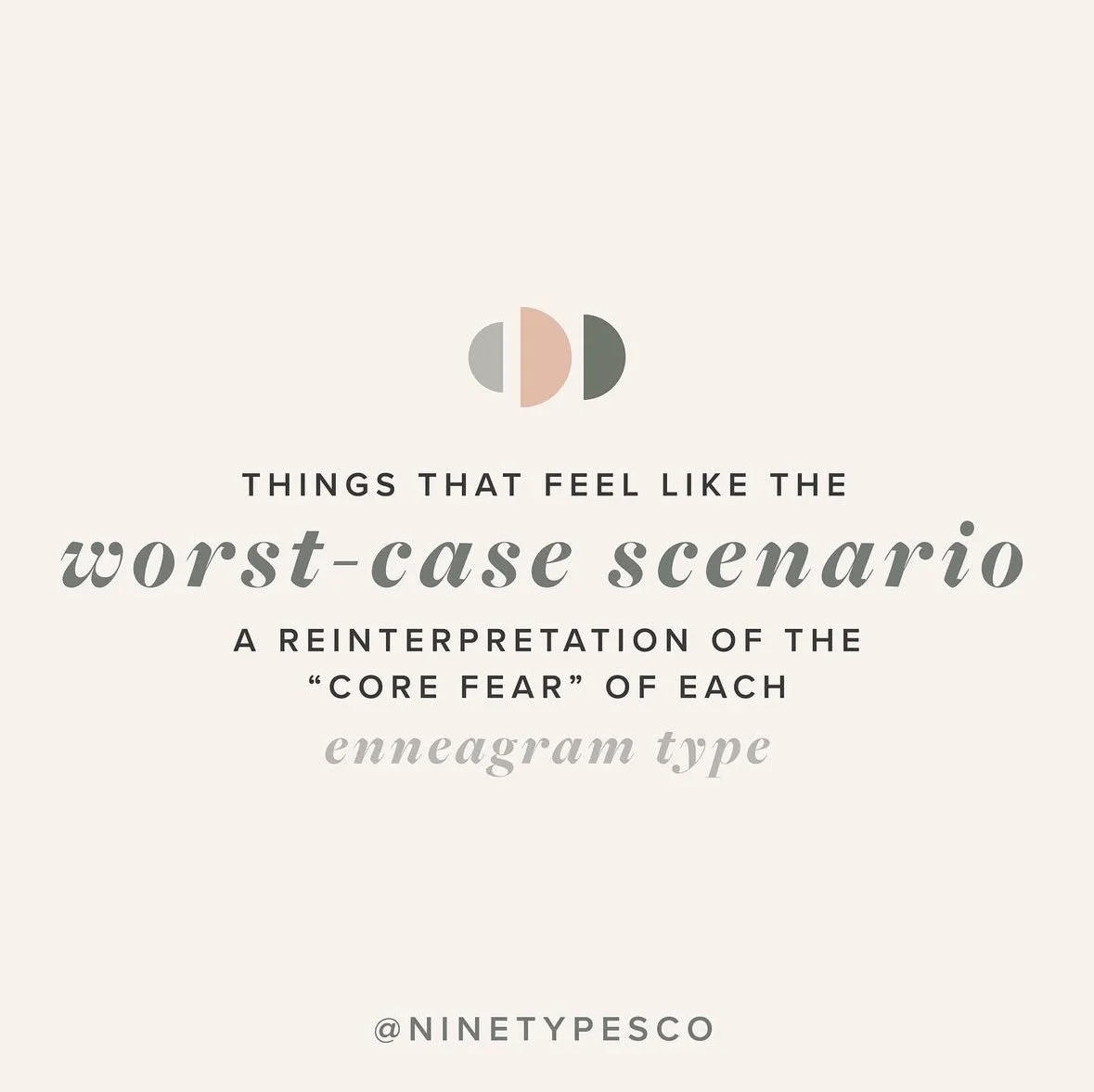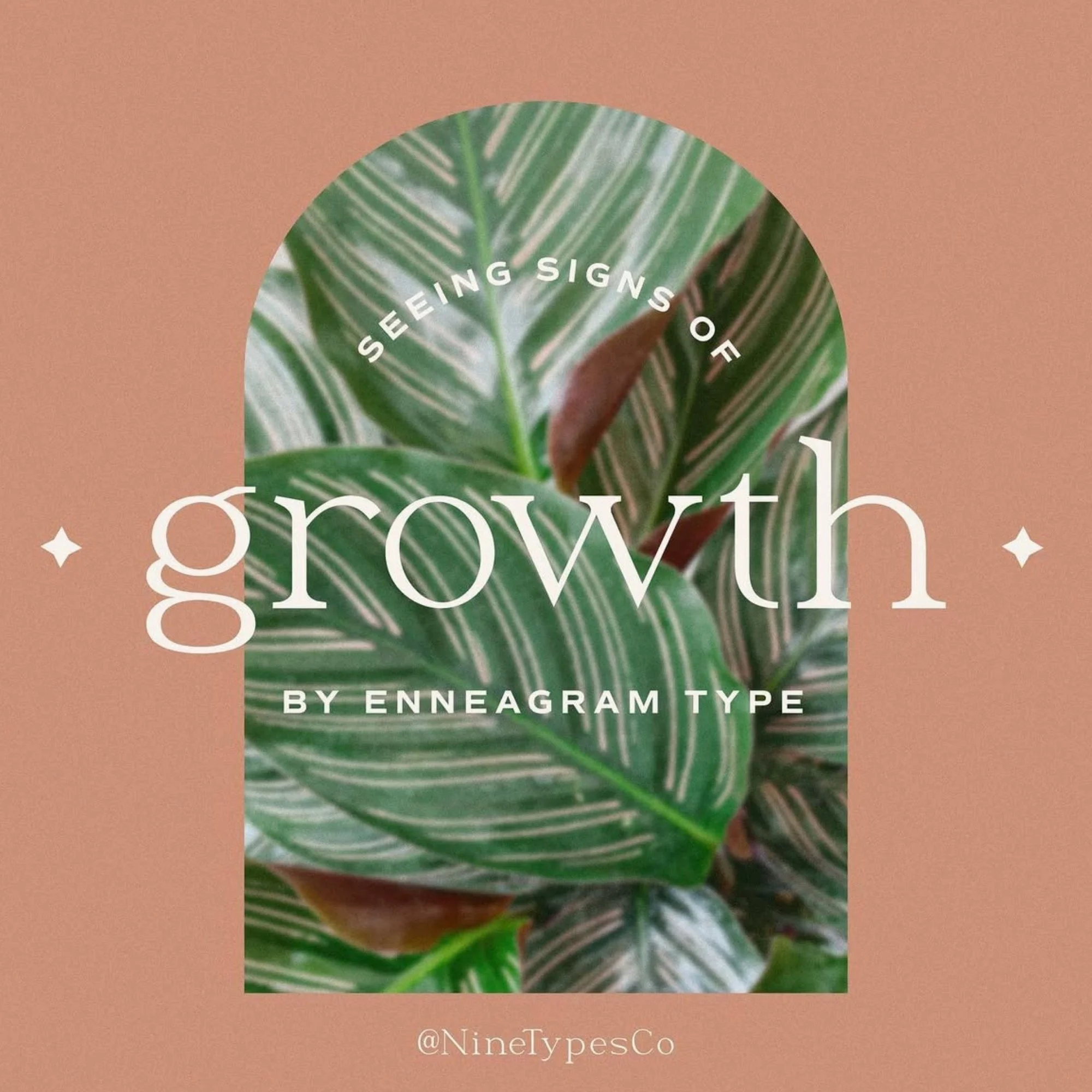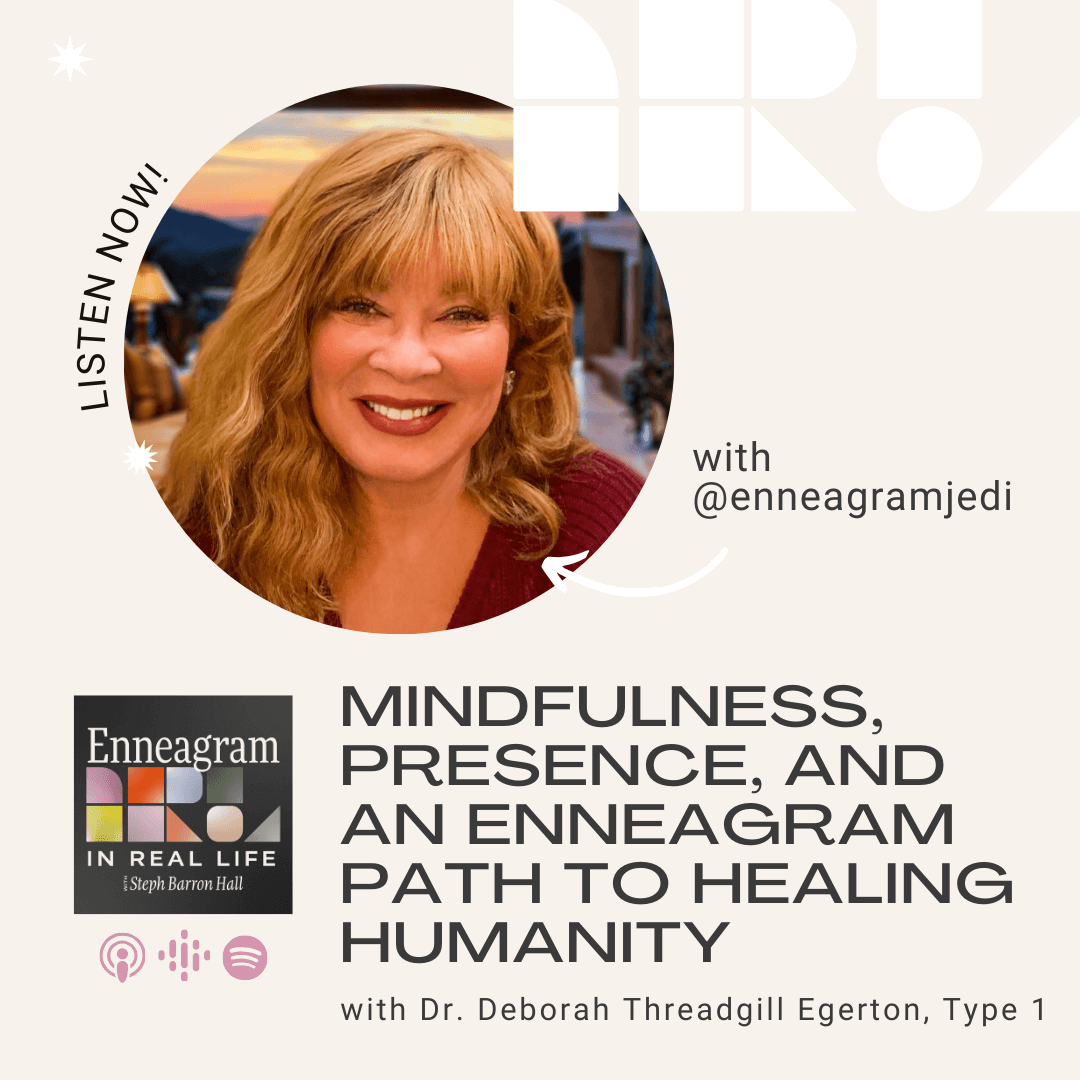Free Enneagram education at your fingertips
Search the Nine Types Co. archive here ⤵
If Each Type Wrote Their Own [Tongue-in-Cheek] Tombstone from Beyond
I would normally let this idea pass on (I have a graveyard of post ideas that will never see the light of day 😉🪦), but ’tis the season, so why not! I was thinking about the phrase, “That’ll be on my tombstone” (and similar sentences), so those inspired this post.
Things That Feel Like the Worst-case Scenario | A Reinterpretation of the “Core Fear” of Each Enneagram Type
Things That Feel Like the Worst-case Scenario | A Reinterpretation of the “Core Fear” of Each Enneagram Type : We often hear about the “core motivation” and “core fear” of each Enneagram type. When I’ve talked about this with people who love the Enneagram (including many of you!), the term “core fear” doesn’t quite resonate. Instead, I’ve begun to teach this as what each type is avoiding or what feels like the WORST for each type.
How to Relate with Each Enneagram Type
Want to deepen your relationships and truly understand the people in your life? This guide explores how to relate with each Enneagram type—Types One through Nine—highlighting what each type values in communication, how they show up in relationships, and how you can connect more meaningfully. Whether you’re a Type Two learning to set boundaries or a Type Seven embracing stillness, these insights will help you grow in empathy and understanding.
Seeing Signs of Growth By Enneagram Type
What does growth look like for you? These aren’t the only signs of growth for each type, but these might help you observe what growth looks like for you. If you notice areas where you’ve grown, take a moment to acknowledge that! Building those habits can take a lot of intentional work. If there are items on this list that aren’t yet available to you, that’s okay, too. This is not intended to be a report card! Even noting a couple of ways you’ve grown is incredible!
What Makes You Feel Valued at Work? By Enneagram Type
Sometimes I think we get so caught up examining the differences between the types that we lose sight of our similarities. When I asked about what makes each type feel valued at work, every type shared that they appreciate being recognized for a job well done, even in small ways. So let your coworkers / employees / managers / group project buddies know how much you appreciate them!
Strengths We’d Love To Borrow From Each Enneagram Type
We all have strengths & weaknesses. I love the idea that we can learn to “borrow” strengths: meaning, we assume we’re capable of growth and change AND we can learn to build on what we’re already good at. We can also acknowledge that each type has some incredible abilities that we can all appreciate!
A Few Things That Make Life Feel Meaningful by Enneagram Type
When I asked in my stories about what makes life feel meaningful, EVERY type said something along the lines of “time with friends,” “being with people I love,” “close family connections,” and other similar responses. The more I work with people, the more I’ve found that human connection is essential to our sense of well-being. It’s not necessarily about Enneagram type!
The Black Enneagram, Cultural Nuance, and Advocacy with Dayo Ajanaku, Type 1
On this week’s episode of Enneagram in Real Life, Stephanie Barron Hall interviews Dayo Janaku, founder of The Black Enneagram. Dayo discusses her journey of creating her Instagram platform to provide Enneagram education through the lens of Black culture. She shares her experiences as a Type One, balancing law school with her passion, and the challenges of showing up online. Dayo also delves into her understanding of her social subtype, the cultural nuances of her Nigerian American upbringing, and how her Type One shows up in her day-to-day life.
Self-Improvement and that Pesky Inner Critic as an Enneagram 1 with Colton Simmons
In this episode of Enneagram in Real Life, Stephanie Barron Hall interviews Colton, the creator of the YouTube channel You’ve Got a Type. Colton shares his journey from a strict Evangelical upbringing and military scholarship to exploring theology, acting, and eventually the Enneagram. A Type One with a self-preservation dominant instinct, Colton talks about anxiety, spiritual reconstruction, and how the Enneagram has become a deep tool for self-awareness rather than a surface-level label. He reflects on how he uses the Enneagram in his marriage with a Type Three partner, his creative process in making long-form video content, and the ongoing work of balancing his inner critic with a desire to offer meaningful, grace-filled insights. Throughout, Colton and Stephanie explore the tension between being helpful and being performative, as well as the power of curiosity and compassion in personal and spiritual growth.
SNEAK PEEK of Enneagram in Real Life (the Book)
On this week’s episode of Enneagram IRL, we meet with Brian Lee. Brian is a pastor, coach, and speaker. As a survivor of spiritual abuse and religious trauma, he has spent his time since leaving vocational ministry in 2021 working to provide recovery and resources for fellow victims and survivors. In 2023, he created and founded Broken to Beloved, a nonprofit organization that exists to help other victims and survivors through its Annual Summit and seasonal Cohorts, while also providing trauma awareness and safeguarding practices to pastors, leaders and churches.
A little over 8 years ago, Chris's life underwent a foundation-shaking shift, prompting him to seek new tools, perspectives, and relationships. He was introduced to the Enneagram, engaged in therapy focusing on inner child work, and enlisted a professional coach. Chris discovered a newfound authenticity and resilience, leading to a richer and deeper life. Out of this life-changing journey, Chris feels a clearer call to lead and coach organizations, teams, groups, and individuals toward greater self-awareness, growth, depth, and transformation.
An Enneagram 1's Path to Freedom, Wholeness, and Letting Go with Brian Lee
On this week’s episode of Enneagram IRL, we meet with Brian Lee. Brian is a pastor, coach, and speaker. As a survivor of spiritual abuse and religious trauma, he has spent his time since leaving vocational ministry in 2021 working to provide recovery and resources for fellow victims and survivors. In 2023, he created and founded Broken to Beloved, a nonprofit organization that exists to help other victims and survivors through its Annual Summit and seasonal Cohorts, while also providing trauma awareness and safeguarding practices to pastors, leaders and churches.
Mindfulness, Presence, and an Enneagram Path to Healing Humanity with Dr. Deborah Threadgill Egerton, Type 1
On this week’s episode of Enneagram IRL, we meet with Dr. Deborah Threadgill Egerton. She is an Internationally Respected Psychotherapist, Best-selling Author and Unity and Belonging Advocate for the Healing of Humanity. Affectionately referred to as Dr. E, she has attained IEA Certification with Distinction for her groundbreaking utilization of the Enneagram in the realm of bridging historical divides. Her work is dedicated to dismantling marginalization and transcending the divisive practice of "othering".
Not Perfect Enough to Be a Perfectionist as an Enneagram 1 with Dani Cooper
On this week’s episode of Enneagram IRL, we meet with Dani Cooper, a Certified Enneagram Teacher, Coach, and totally-biased cheerleader for individuals, couples, and teams who want to find out who they really are and grow beyond the armor of their Enneagram types. She is the author of the book, The Enneagram for Christian Couples, which came out in 2022. Her life's work is learning how to love herself as a messy, imperfect and absolutely enough human person.
Communication by Enneagram Type
When I think about communication, I think about more than just talking: it’s how we express ourselves (even silence is a form of self-expression), it’s how we connect (or don’t), it’s how we build relationships and cultivate our lives. It’s everything! And this is one of THE most important ways I think we can use the Enneagram. How do you communicate with yourself? (Yes, it’s a thing!) And how do you communicate with others?
If you’ve been curious about using the Enneagram for growth, improving your relationships, and deepening self-awareness, I have good news for you!
Finding Purpose as an Enneagram 1 with Liz Goulding
On this week’s episode of Enneagram IRL, we meet with Liz Goulding, ADAPT Certified Health and Wellness Coach. Liz focuses on the intersection of personal well-being and professional development, working primarily with creative professionals and self-employed individuals who want more energy and capacity to meet life's challenges and opportunities. We discuss navigating day-to-day life, running a coaching business, and experiencing personal growth as a Self-Preservation Type One. I’m particularly excited about this conversation because, fun fact, Liz is my personal coach!
A Few Things to Know About Ones
While Type One is commonly known as “The Perfectionist”, it’s important to note that their main focus isn’t really about being perfect or being the best. “Being good” is much deeper than that, but it’s hard to find and sustain. In this post, I mention Ones repress their anger, and while most Ones do this to some extent, some Ones (the sx subtype in particular) are more comfortable feeling and expressing anger. Also, Ones often wish others knew that when they correct or advise, they genuinely want to help. They’re not trying to be mean.
Type Ones in Relationships
In relationships, Ones value truth and kindness. They make sure to take care of their loved ones’ practical needs, and they take responsibility for many of the small and large tasks of life. When less healthy, they tend to feel like they are the only adult in the room and can grow resentful of others who don’t take things as seriously. They are focused on self-improvement, and in relationships, they seek to help others flourish as well. They bring sincerity and integrity to their relationships.
FEATUREDGetting on Each Others’ Nerves
BY ENNEAGRAM TYPEWe all get on each others’ nerves every now and then.
When I say we “get on each others’ nerves,” what I mean is that we all do things that irritate others, and others do things that irritate us. I truly believe this is just a natural part of being a human in relationships with other humans.
We especially tend to get irritated when we see our own unwanted behavior in others OR when we experience others’ behavior as an accusation. For example, if a coworker edited your writing on a shared document, it could be easy to think, “Wow, she must just think I’m not smart enough to figure this out,” when in reality, the coworker might be thinking…


![If Each Type Wrote Their Own [Tongue-in-Cheek] Tombstone from Beyond](https://images.squarespace-cdn.com/content/v1/6329731a9dd6ad534b43d5f0/1761936413849-WEOGOCPL83E4SKI5NPN3/If+Each+Type+Wrote+Their+Own+Tongue-in-Cheek+Tombstone+from+Beyond.png)
















